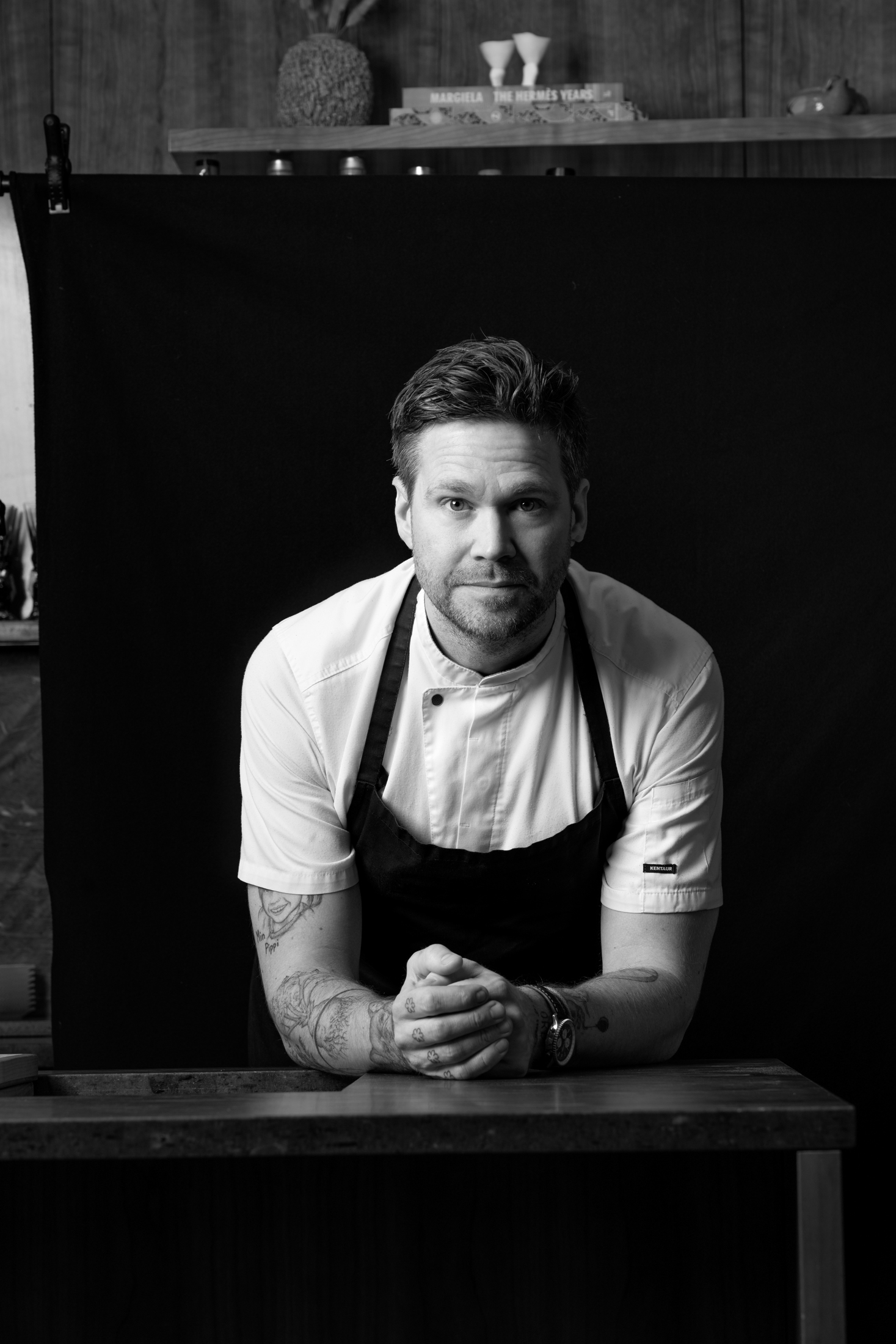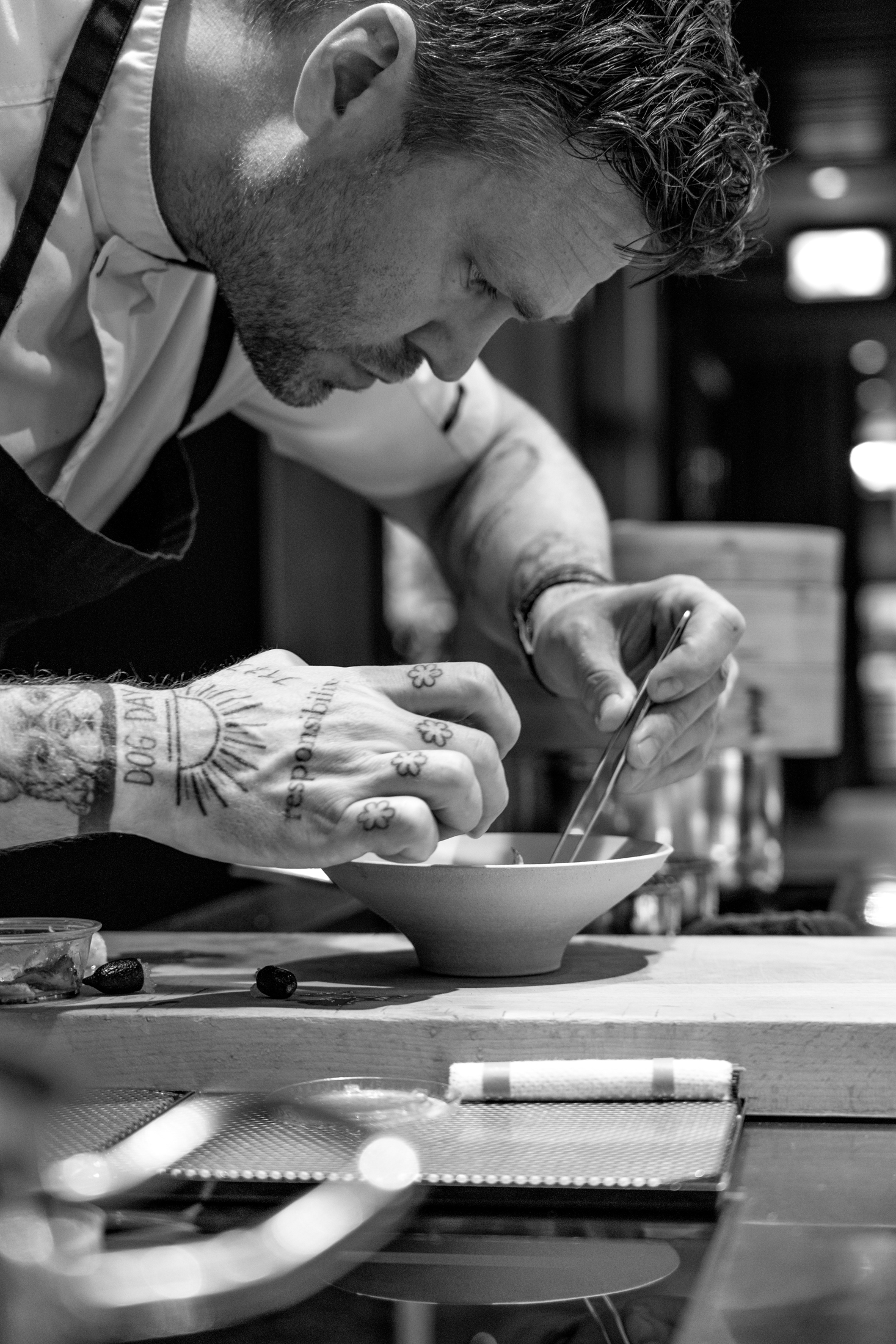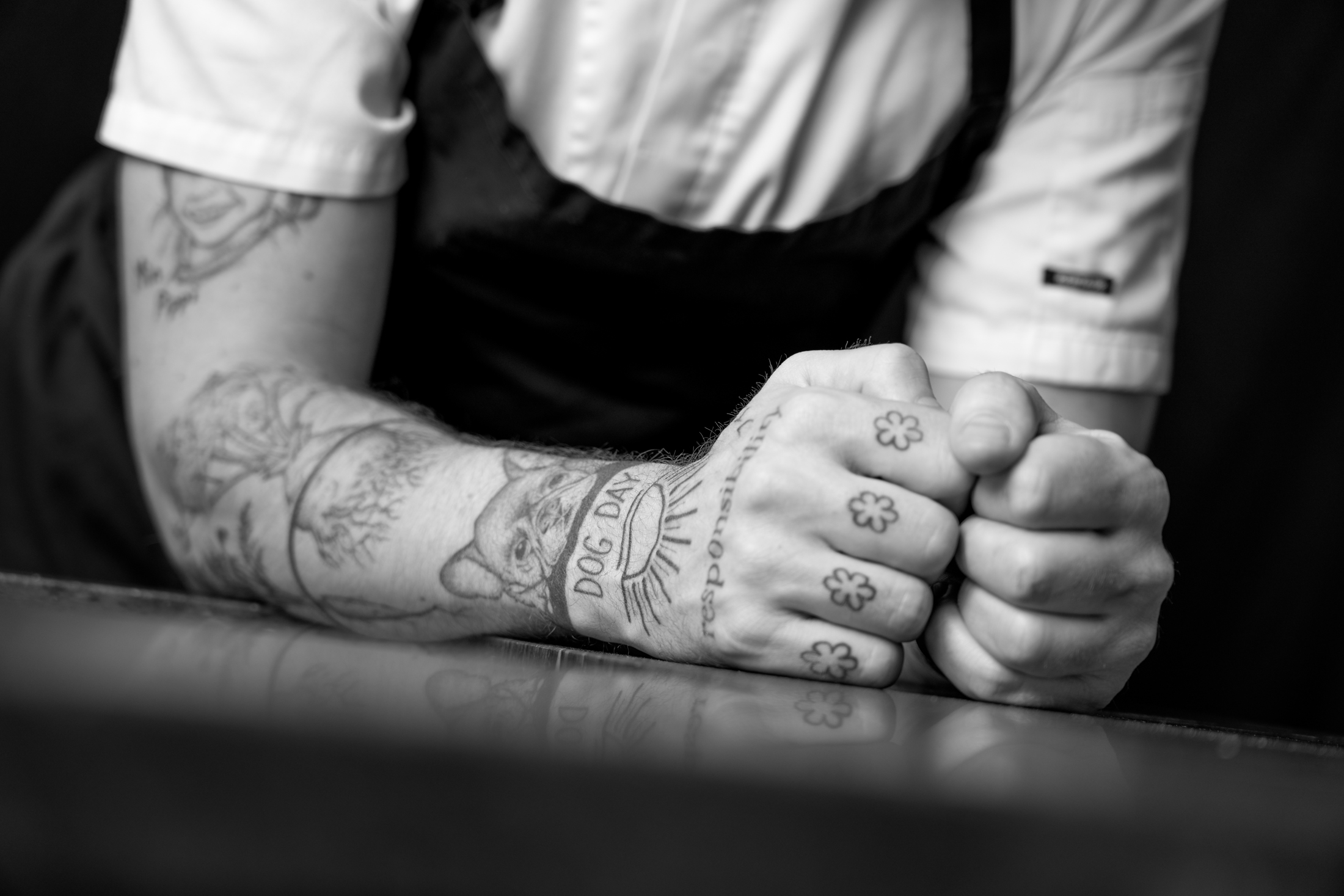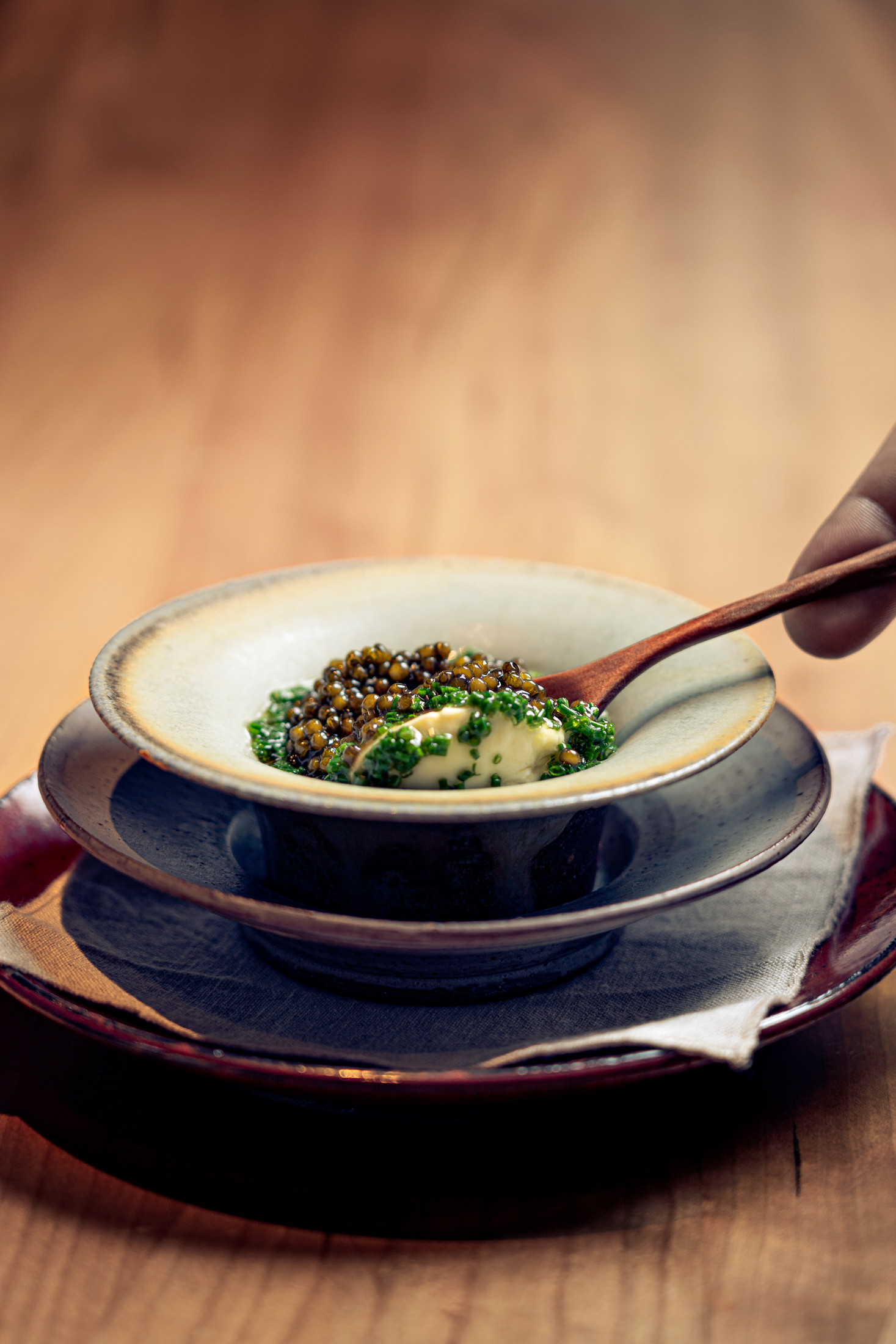← Back
Marcus Jernmark, Executive Chef
Interview, 10 June 2021
In conversation with Marcus Jernmark, Executive Chef at Restaurant Frantzén in Stockholm.
On his journey from Sweden to the New York City fine dining scene, becoming a leader and what defines true greatness in the culinary world.
In 2014, Björn Frantzén was scouting for a chef with international experience.
An integral piece to help him complete his vision for his Magnum Opus, Restaurant Frantzén in the heart of Stockholm.
He called Marcus Jernmark, who at the time was cutting his teeth as a head chef in New York City, and asked him to come work with him in the Swedish capital.
The call from Frantzén was timely, as Jernmark at this point was contemplating his future. He accepted the offer.
Over the course of the next seven years, they established Frantzén as one of the best fine dining restaurants in the world. In 2018, Frantzén became the first Swedish restaurant to receive three stars in Guide Michelin, placing it among the top one hundred eateries in the world.
We were curious to know more about Marcus Jernmark and his journey.
Is it the ambition to be the best that drives him? How do you make a team perform in the kitchen and how does a restaurant stand out, when the culinary boundaries have been pushed to its limits?

At age 23, you moved from Sweden to the US to work at the Swedish consulate in Manhattan. What was that experience like?
– I’ve given this a lot of thought. In truth, the consulate was a very protected environment compared to the New York restaurant scene. I was blessed to get a smooth start in that sense. I was given a lot of freedom. When preparing food for dinners at the consulate, the aim is to guide people through interesting conversations using the food as a vessel. But to a large extent, the aim is also to challenge and impress the guests and the ambassador or consul. Many senior chefs work in consulates because it’s a nice environment, steady income, no work on the weekends, and so on. On the other hand, many young chefs pursue work at embassies and consulates because it gives them a great opportunity to go out and see the world. So, for me, as a 23-year-old, it was an excellent start to my career abroad.
But after a while I suspect you were itching to try your wings in the “real” world of the bustling New York restaurant business?
– Well, I had my three-year contract with the consulate that was coming to an end. I think everyone who moves abroad find themselves in sort of a mini crisis after about a year and a half. That’s when you start to question whether to stay and fight or pack up and go home. Mine was a classic case of having a girlfriend who moved back home, and then feeling quite lonesome and lost. But after sticking to it I found myself really settled and having the time of my life, both socially and professionally, in my third year. By that time, I decided to stay in NYC. I needed more experience and really had nothing to show for my three years at the consulate, on paper. I figured my resume needed some more weight.
What was your next move?
– I had a friend who worked at Aquavit. By that time, in 2009, the city was badly hit by the recession and Aquavit needed some fresh blood and a new vision after many years of success under its founder, Marcus Samuelsson. The concept had stagnated, and I was brought in because I was Swedish, young and energetic. And just like that, I found myself in the thick of things.
“Becoming a boss at such a young age wasn’t beneficial for me, nor was it beneficial for the people working around me.”
/Marcus Jernmark
How have the years in this inspiring and creative, yet tough and unforgiving environment shaped you as a chef and a human being?
– To be honest, I don’t think it has sunken in properly. I’m genuinely a decent enough human being who prefers to listen rather than yell at people. But becoming a boss at such a young age wasn’t beneficial for me, nor was it beneficial for the people working around me.
How did that manifest itself in the workplace?
– A ton of stress. I tended to take on too much responsibility and ended up being an agitated leader, which is never a good thing. The restaurant was constantly fighting an uphill battle, and those years were too stressful for me, in hindsight. Even when Aquavit was at its peak, it wasn’t going well and it was a really toxic environment to be in, so I decided it was time to leave.

After another job in NY, you got a call to come home and become Executive Chef at restaurant Frantzén in Stockholm. We all know the high ambitions of that place.
Was it tough figuring out how you wanted things to be under your leadership?
– I think it was typical of how it is when you put two strong wills in the same room. I’m sure Björn (Frantzén) had a clear idea of what I could bring to the restaurant, but he was also taking a huge risk in flying me in to include me in his long-term vision. I also understood the challenges and risks, and what the consequences would be if it all went south. But the two of us quickly realized that we come from two different places and traditions, and that this could become really great if we just learned to respect each other’s different views and opinions. So, we found a way to do that. Björn knew that my intentions were for the best of the restaurant. A restaurant which was his life’s work.
His gamble paid off. It was a great learning experience for the both of us.
If you let your guard down and learn to co-exist and work together, there are no limits to what you can achieve.
I’m curious of how things work on a regular weekday in a kitchen like Frantzén. When you have the three Michelin stars, the reputation and the team in place. How do you go about keeping the flame burning and not stagnating? How do you constantly reinvent yourselves?
– Well, even a well running machine needs service from time to time. My primary duty is to oversee the culinary development of the restaurant in Stockholm and the one in Singapore (Zén), so I have delegated certain service-related duties to my colleague, Charlie Benitez. Having said that, I’m a very hands-on type of guy, I always try to stick my head in the kitchen to stir things up and keep our team on their toes. Communication is key to the development and continuity of a restaurant. One particular blessing that comes with getting three stars is that you can be sure you will be fully booked. As long as things don’t degenerate you are awarded the luxury of thinking ahead. That’s one of the great tragedies for chefs and restauranteurs today, they are never allowed to think long-term and have to deliver instantly in order to survive.

“I think the future will focus more on the experience for the guests and the memories you create for them, not just the food.”
/Marcus Jernmark
When you speak of the challenges that come with being a young boss with loads of responsibility, how much better of a leader would you consider yourself to be today?
– I’m a completely different person today compared to who I was at 26, for one.
I learned one important thing at Per Se, the restaurant in New York I worked at following my time at Aquavit. Which was that if you demand one hundred percent from your chefs, then you have to give them the prerequisites to perform at that level. Something we were never able to do at Aquavit, for example. For different reasons.
At Frantzén, we are able to deliver those prerequisites, so I know what I can expect from the team, and vice versa. If you break that bond, then all you can do is look in the mirror and ask yourself whether you hired the wrong person or trained them poorly. All that comes with experience and age. Whenever I hire today, the ambition is always for that person to rise to the very top.
You’ve travelled a lot in your line of work and have witnessed culinary arts around the globe. Is there anyone in particular who have made an impression on you?
– I would say there are two categories here: those who deliver culinary arts that have made an impression on me – and those who have chosen a path in their lives that has sparked almost a feeling of envy. Like the top sushi chefs who master their crafts over long periods of time, with supreme discipline. But I have always wanted more from life than just my craft.
I’ve never seen myself as a restauranteur with restaurants all over the world, I search for the complete life experience. That’s something I have discussed a lot with my wife, how to find that perfect balance. But back to your question, if you look at someone like César Ramirez from Chef’s Table at Brooklyn Fare. He’s established a life where he gets to work with foods he’s passionate about and considers himself a leader rather than a chef.
I cannot say if he considers his life complete, but there is something romantic about his life that I would like to gravitate towards.
What defines a great restaurant, in your opinion?
– I would like to focus on great products in the future, and the people who come out to eat. Once you get to a certain level in this world, all chefs are amazing. But I think the future will focus more on the experience for the guests and the memories you create for them, not just the food. When you frequent a restaurant in the upper echelon of the culinary world, you pay for the food and almost take the quality for granted. But the soft values, like service and the overall experience, is what truly defines a great establishment.

Editors note: In midsummer of 2021, Marcus Jernmark will return to the US after his seven year spell at Frantzén. His former Sous Chef, Charlie Benitez will take over as Executive Chef.
Jernmark’s new project will be an intimate, invitation-only restaurant concept in the Los Angeles area. Stay tuned.